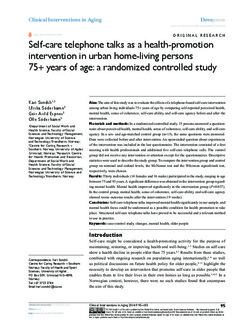Self-care telephone talks as a health-promotion intervention in urban home-living persons 75+ years of age: a randomized controlled study
| dc.contributor.author | Sundsli, Kari | |
| dc.contributor.author | Söderhamn, Ulrika | |
| dc.contributor.author | Espnes, Geir Arild | |
| dc.contributor.author | Söderhamn, Olle | |
| dc.date.accessioned | 2015-06-10T08:11:13Z | |
| dc.date.accessioned | 2015-06-11T12:26:40Z | |
| dc.date.available | 2015-06-10T08:11:13Z | |
| dc.date.available | 2015-06-11T12:26:40Z | |
| dc.date.issued | 2014 | |
| dc.identifier.citation | Clinical Interventions in Aging 2014, 9:95-103 | nb_NO |
| dc.identifier.issn | 1178-1998 | |
| dc.identifier.uri | http://hdl.handle.net/11250/284924 | |
| dc.description | - Published article -cc-by-nc | nb_NO |
| dc.description.abstract | Aim: The aim of this study was to evaluate the effects of a telephone-based self-care intervention among urban living individuals 75+ years of age by comparing self-reported perceived health, mental health, sense of coherence, self-care ability, and self-care agency before and after the intervention. Materials and methods: In a randomized controlled study, 15 persons answered a questionnaire about perceived health, mental health, sense of coherence, self-care ability, and self-care agency. In a sex- and age-matched control group (n=15), the same questions were answered. Data were collected before and after intervention. An open-ended question about experiences of the intervention was included in the last questionnaire. The intervention consisted of a first meeting with health professionals and additional five self-care telephone calls. The control group did not receive any intervention or attention except for the questionnaires. Descriptive statistics were used to describe the study group. To compare the intervention group and control group on nominal and ordinal levels, the McNemar test and the Wilcoxon signed-rank test, respectively, were chosen. Results: Thirty individuals (14 females and 16 males) participated in the study, ranging in age between 75 and 93 years. A significant difference was obtained in the intervention group regarding mental health. Mental health improved significantly in the intervention group (P=0.037). In the control group, mental health, sense of coherence, self-care ability, and self-care agency showed worse outcome results after the intervention (19 weeks). Conclusion: Self-care telephone talks improved mental health significantly in our sample, and mental health focus could be understood as a possible condition for health promotion to take place. Structured self-care telephone talks have proved to be successful and a relevant method to use in practice. Keywords: case-control study, changes, mental health, older people | nb_NO |
| dc.language.iso | eng | nb_NO |
| dc.publisher | Dove Medical Press | nb_NO |
| dc.relation.uri | http://www.dovepress.com/self-care-telephone-talks-as-a-health-promotion-intervention-in-urban--peer-reviewed-article-CIA | |
| dc.title | Self-care telephone talks as a health-promotion intervention in urban home-living persons 75+ years of age: a randomized controlled study | nb_NO |
| dc.type | Journal article | nb_NO |
| dc.type | Peer reviewed | en_GB |
| dc.date.updated | 2015-06-10T08:11:13Z | |
| dc.source.pagenumber | 95-103 | nb_NO |
| dc.source.volume | 9 | nb_NO |
| dc.source.journal | Clinical Interventions in Aging | nb_NO |
| dc.identifier.doi | 10.2147/CIA.S55925 | |
| dc.identifier.cristin | 1084686 | |
| dc.description.localcode | This work is published by Dove Medical Press Limited, and licensed under Creative Commons Attribution - Non Commercial (unported, v3.0) License. The full terms of the License are available at http://creativecommons.org/licenses/by-nc/3.0/. Non-commercial uses of the work are permitted without any further permission from Dove Medical Press Limited, provided the work is properly attributed. Permissions beyond the scope of the License are administered by Dove Medical Press Limited. Information on how to request permission may be found at: http://www.dovepress.com/permissions.php | nb_NO |
Files in this item
This item appears in the following Collection(s)
-
Institutt for sosialt arbeid [1205]
-
Publikasjoner fra CRIStin - NTNU [37177]
